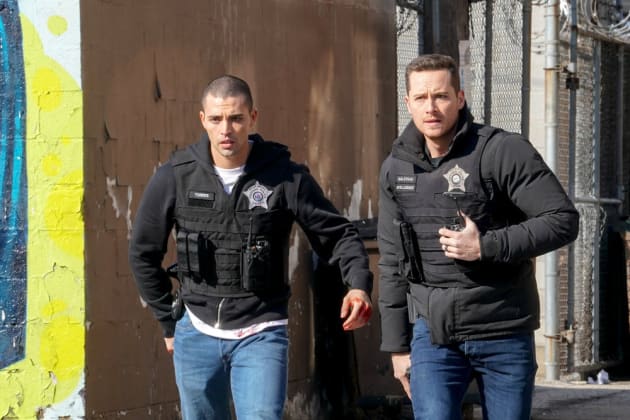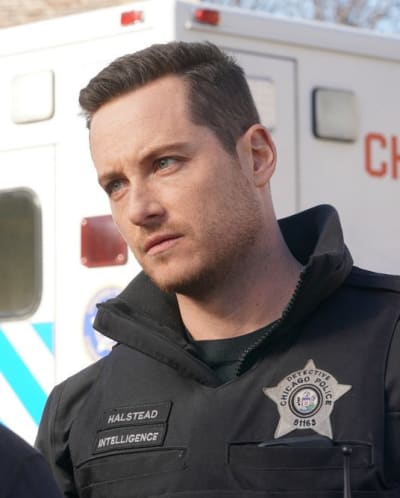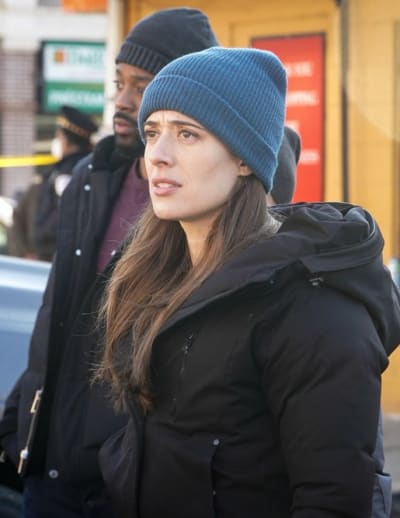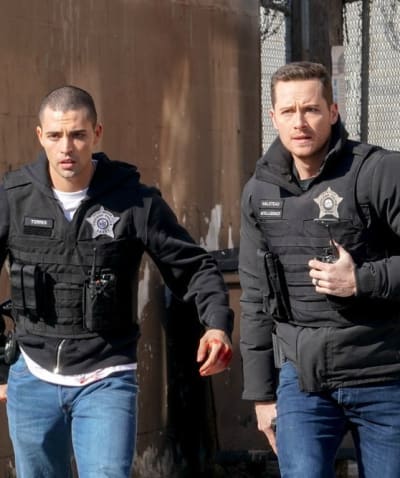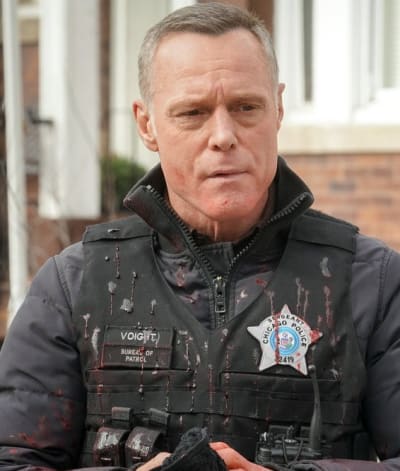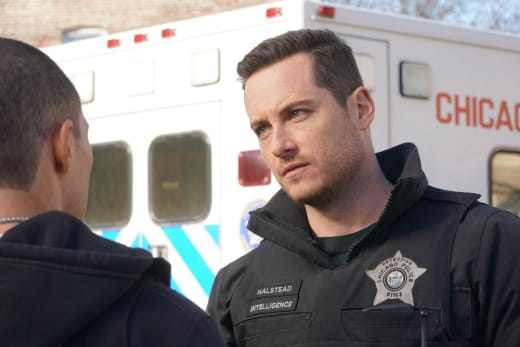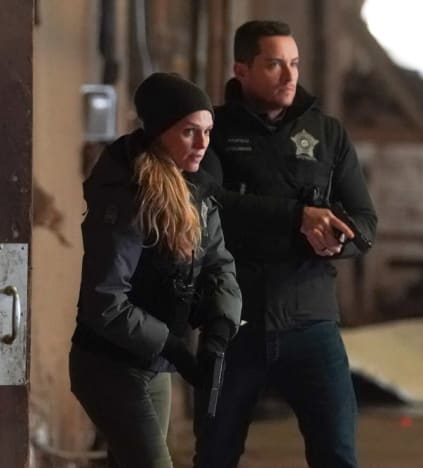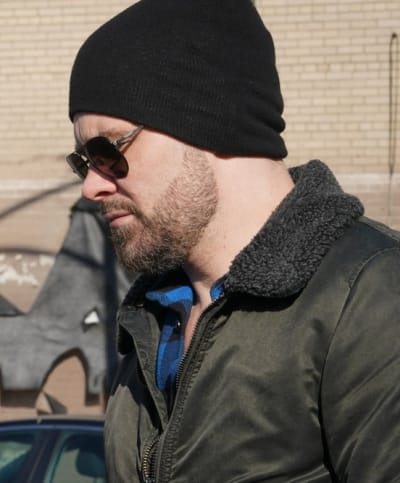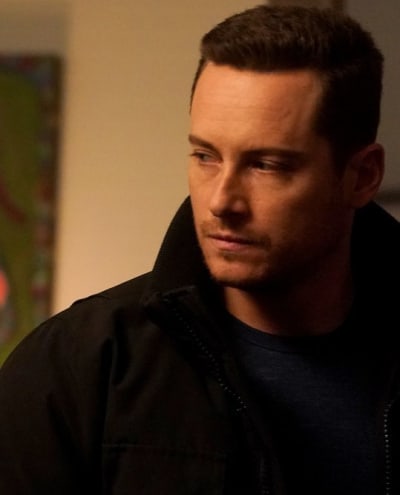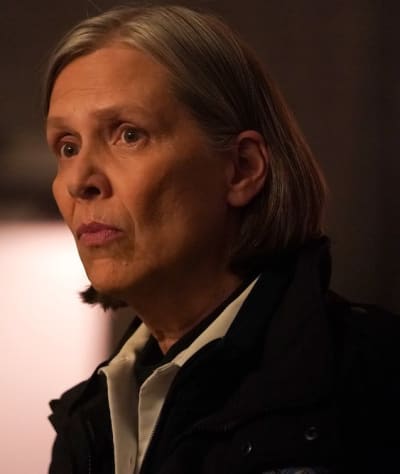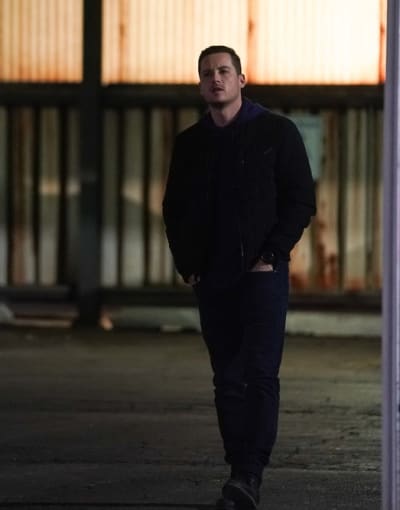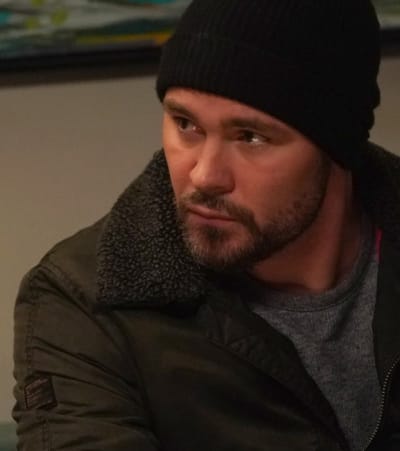Can we keep Torres permanently?
They delivered one of the strongest case and character studies with Chicago PD Season 9 Episode 18. While it centered around Halstead, it was mysterious recruit Torres whose layers we unpeeled throughout the hour.
And by the end, it left you wishing he’d become a more permanent fixture on the unit.
We’ve missed some elements of the series in recent years. Many fans harp on the loss of patrol and how that has impacted the series. And there’s no doubt that it has, especially when it sidelined Trudy more.
But it’s that fresh face quality of those who are still green to everything and finding their footing and their identity in the field of policing that lacks, too.
Over time, we’ve lost many characters, some of whom never got their replacement. And while there’s nothing wrong with the unit as it is, we’re long overdue for some fresh blood to add new elements and vibes to the show and the unit.
And that’s probably why Torres stood out instantly, despite his tacit, stoic exterior and the mysterious nature behind if he was a friendly or something else entirely. He’s a genuinely refreshing character and exactly what this series needs.
It was so good to see Benjamin Levy Aguilar onscreen again. He was fantastic in the short-lived Filthy Rich, and he was even more so during this installment. He and Soffer had great chemistry and killed it.
The opening scene of Trudy and Halstead watching the recruits felt like such a throwback to when Al first saw Ruzek in action. And from the nod to the series’ roots onward, we were treated to a fascinating and deceptively layered installment.
Trudy: He’s either going to be a great cop…
Recruiter: Or we’re hiring up a psycho.
It touched on things like police reform, stereotypes, and more without getting preachy about it, and as a result, the hour and, namely what Torres’ brought to the table was effective.
Of course, the hour also stayed true to the course with Halstead’s role in the unit. Since the resolution of the Roy situation, he asserted himself as a leader and equal, and New Guard showcases that well.
We get to see Jay in this mentor role with Torres, something we haven’t experienced much before. And with him running lead on the case, it’s one of the first times there’s the distinctive vibe of Jay as a future sergeant and Voight’s successor.
While the hour mostly focused on Halstead and Torres, it felt like a peek into what a unit would look like under Halstead’s helm. But interestingly and blessedly, the installment provides us with this without going the predictable and tiring route of setting Halstead in opposition to Voight or challenging him in some way.
If we’re ever to buy into Halstead’s new and future role, whenever that may be, we need to see him as active irrespective of Voight rather than simply reactionary and contrary to him.
Halstead’s handling of Torres as his trainee and Anna as an asset and CI gave us insight into how he’d be a leader.
He took his job with Torres seriously, well before he had reason to suspect the kid of anything. Honestly, there were a few moments when Jay came across as a power tripper, and the irony of him prying into Torres’ life and trying to get him to talk wasn’t lost when Jay was never known to be a big talker himself.
But you could tell early on that Torres had heaps of potential, but he had the potential to butt heads with Halstead if he didn’t follow every single one of Halstead’s orders.
Ironically, Torres never came across as the insubordinate and impulsive type, but he was someone who followed his instincts, and there were times when that would contradict Halstead’s expectations.
Halstead had his moments, but it was generally refreshing to see him in this type of arc rather than one that tied him back to Hailey or Voight. It didn’t give us too much personal information on him, but we don’t always need that in the first place.
An hour giving us Halstead in action professionally with someone new was satisfactory on its own and a nice change of pace.
The action was on point, too. The scenes in the bodega were intense, and the hour wasn’t lacking in shootouts.
But one of the best sequences was Halstead and Torres pursuing a perp, with Halstead guiding Torres through the best and safest way to do so. During that sequence, the camera work and everything were perfect, and the secret compartment shooting was intense.
Are you always like this or is it just for me? This is squad banter, the one-word answers.
Torres. I’m answering you.Halstead
Of course, the action at the undercover meetup was great, too, particularly when they breached the scene when they felt Torres was in danger.
But in addition to this exploration of Jay in a leadership role, it also felt like a great learning opportunity and some awareness for him via his experience with Torres.
Kudos to the series, as this is how you make some commentary and explore police reform in an organic way without detracting from the storylines and what draws people to the show.
Trudy shared that for myriad reasons ranging from the societal response to police, lack of interest, and so forth, it’s prompted them to loosen up on some of their restrictions and broaden their scope of potential candidates into the academy.
You want real answers? I’ll give them.
Torres
You could hear the uncertainty and frustration in their voices when they discussed this, but through Torres, we slowly realize why this isn’t necessarily the worst thing in the world.
It’s no secret that the system is severely flawed and needs fixing. As much as some experienced cops may turn their noses up at the new changes reflected in their choice of recruits, it could also be more of what the field needs in the first place.
And Torres is evidence of how the system can benefit from these changes. At the heart of the discussions about police reform and where things are going wrong is the shift away from community policing and all that it entails.
And for many people, one of the biggest frustrations is that police forces are overrun with law enforcement policing communities they aren’t even a part of, are familiar with, or have any real investment in.
How do you police and manage things and people you don’t understand and make no effort to, right?
What makes Torres a great potential officer is his understanding of the world that he’s policing. He lives in it, has experienced it, and has been on the opposite side of the law and its pitfalls.
But traditionally, the field hasn’t been open to people like Torres.
It was downright maddening that the brass pushed Torres on Intelligence, not because of this program but their need to suss out which of the Brown recruits from a specific background could have possible gang connections.
Torres: My world ain’t black and white. And I get you can’t understand that.
Halstead: Try me.
For one, it’s utter bullcrap to blindside them like that and possibly endanger lives by having officers working alongside a potential unfriendly. It’s risky as hell, too. It jeopardizes people’s lives and cases; that move was absurd!
It was also laughable that with the plethora of issues afflicting CPD, their thinly veiled distaste for the slacked qualifications is what had them in a tizzy as if there aren’t many cops on the force presently who aren’t getting paid off or have these same connections.
But by digging into these new recruits it sowed seeds of doubt and distrust, and it potentially ends innocent people’s careers before they can even take off.
We saw that Torres was a good kid. What if he didn’t have Halstead and the others around who could eventually give him the benefit of the doubt?
And Torres didn’t have any picnic with Halstead. At some point, Jay literally did believe that Torres was the one who leaked the storage facility.
Jay struggled with Torres’ lack of communication and reluctance to share anything about himself. Ironically, the more he pushed, the more it made you relate to Torres.
Why do we feel entitled to information about people we only just met? And as Torres pointed out later, everyone was trying to feel him out to see if he was trustworthy, but they expected him to submit to their will and trust them implicitly when he had no reason to do so.
It spoke to the culture of police and the communal response to them. Because Torres represents what happens when someone from communities most susceptible to police overreach or indifference valiantly pursues the job.
They always say “be the change,” but what Torres is enduring is what happens when people actually do that. We’ve seen this in some ways with Atwater, too, yes?
Halstead wanted his authority recognized and respected. He also anticipated Torres needing to prove himself to him.
But Torres’ experiences shape him differently. It was a great way of showing the disconnect. Halstead was waiting for Torres to earn his trust the entire time, partly because he needed to figure out if this kid had gang affiliations and ulterior motives.
However, Torres was realistically guarded, and as a result, it kept making him suspicious.
Even with Anna’s intel about Torres almost killing someone, it was easy to assume there was more to the story. His reaction to the undercover assignment spoke volumes, and you could conclude that he had a strained relationship with his criminal stepfather.
The revelation that he saved his mother from an abuser, and that’s what landed him in juvie, cut like a knife. He spent most of the hour with people questioning his motives, and he was smart enough to pick up on it even if he didn’t say anything right away.
Torres was aware of the uphill battle he faced and the snap judgments, microaggressions, and other issues he faced from others too. But he knew he had something to offer and could make a difference, which makes him such an intriguing character.
His final exchange with Halstead was probably the best scene of the hour. I can’t think of another character he could have contrasted with any better.
Before I beat up my stepdad, I called the police. Six times. And they didn’t help. That’s why I want to be a cop. And I’d be damn good at this job.
Torres
For better or worse, Jay is notoriously judgmental, and he often sees things in black in white. His military experience also contributes to his viewpoints on protocols, authority, and following orders.
And traditionally, there’s always a detachment from certain worlds and communities with Jay because he doesn’t understand them and at times, doesn’t step outside of his view and experience to do so.
They knew what they were doing with this dynamic, right down to the subtle mention of the respective neighborhoods they grew up in Chicago.
Jay’s experience with people with Torres’ experiences and backgrounds are on the other side of the law. They’re confidential informants like Anna, victims, or perpetrators. They’re not cops.
But isn’t that the problem? Everyone brings something to the table, but what good is it when there’s restrictive screening and judgment over who can access the table in the first place?
Torres felt more comfortable in the hood he grew up in than the place he listed when he applied to the force. But he suspected they wouldn’t approve of his home because of the criminal elements and the community or that he pays off protection fees for his mother’s store.
Torres lives the urban Chicago life. He breaths and bleeds it. He’s better attuned to it than anybody. And it’s perhaps because of that experience that he has situational awareness, great instincts, and is incredbly observant.
Because of all of that, he’s built to be the top a cop the city needs. He’s an asset because he can walk two different worlds. Shouldn’t he be the future of policing?
Maybe recruits that have more experiences like Torres rather than the litany of them with backgrounds like Ruzek could be the change needed.
The contrast between Ruzek as a legacy kid recruit shot right up to Intelligence with Torres as the former gang member suspected of the worst wasn’t lost.
Ruzek is a good cop, no doubt, but he got to ride on his father’s reputation before he could stand on his own, and it always nodded at the ingrained nepotism in the field.
Whereas everything from where Torres grew up, to his age and race were these factors in why he was suspicious. He kept his head down, didn’t speak about his past, and let his actions speak for themselves, but that wasn’t enough.
Thankfully, by the end, with that final conversation between Torres and Halstead, it was a turning point. Like Anna, it was easy to develop a soft spot for Torres. Hell, I’m related to a few.
At the risk of oversharing, I definitely remember a former classmate during a policing course back in college who had a similar background, passion, and reasoning for why they were pursuing law enforcement. They experienced discouragement and judgment, too.
Torres was one of the most gripping characters in some time, and this was a great installment.
OVer to you, Chicago PD Fanatics. Please, sound off below! What’s your impression of Torres? Did you enjoy this Jay-centric?
You can watch Chicago PD online here via TV Fanatic.
Jasmine Blu is a senior staff writer for TV Fanatic. Follow her on Twitter.

